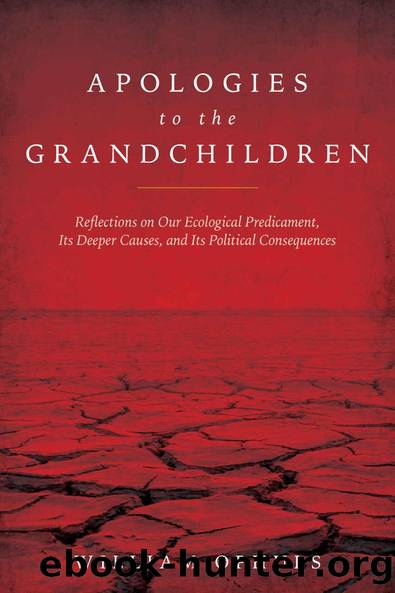Apologies to the Grandchldren: Reflections on Our Ecological Predicament, Its Deeper Causes, and Its Political Consequences by William Ophuls

Author:William Ophuls [Ophuls, William]
Language: eng
Format: epub
Published: 2018-12-03T00:00:00+00:00
THE POLITICAL ANIMAL
9.
History And Human Nature
For mankind is ever the same and nothing is lost out of nature, though everything is altered.
â John Dryden67
[Manâs] needs and nature are no more changed...in ten thousand years than the beaks of eagles.
â Robinson Jeffers68
One of the most commonly expressed sayings about history is that it does not repeat, but it does rhyme.69 So there are no exact recurrences, because circumstances alter historical cases. Yet certain phenomena recur with some regularityâfor example, economic booms and busts or the decay of virtue into decadence. Each instance may be particular, but each fits a general historical pattern, mutatis mutandis. So history is not random, not merely James Joyceâs ânightmareâ or Edward Gibbonsâs âregister of the crimes, follies, and misfortunes of mankind.â70 It has something to teach and is even, to some degree, predictable. Harry Truman put it well: âThere is nothing new in the world except the history you do not know.â71 But why does history rhyme?
Voltaire gave a pithy answer: âHistory never repeats itself, man always does.â72 History recurs because of the unchanging human nature asserted by the poets Dryden and Jeffers. This insight was given its definitive form by the political philosopher and historian Niccolò Machiavelli:
Wise men say, and not without reason, that whoever wishes to foresee the future must consult the past; for human events ever resemble those of preceding times. This arises from the fact that they are produced by men who have ever been, and ever will be, animated by the same passions, and thus they necessarily have the same results.73
What are these passions?
To this question historians have given different responses, but their answers all point in the same direction and tend to supplement, rather than contradict, each other. Will and Ariel Durant emphasize the power of human instincts: âHistory repeats itself in the large because . . . man is equipped to respond in stereotyped ways to frequently occurring situations and stimuli like hunger, danger, and sex.â74 Driven by their amygdala and limbic system, the seats of instinct and emotion, human beings tend to react rather than reason. They flee pain, pursue pleasure, fall madly in love, leap before looking, lose their heads, become addicted, and so on. To make matters worse, the effects of the passions are amplified by the defects of human cognition, which tend to create an illusion of rationality where none exists. So the generality of humankindâincluding the average politicianâbumbles through life largely unaware of their real motives and mostly incapable of setting aside their passions as they make critical decisions. Those who exhibit some degree of rational self-control or foresight are hailed as saints, sages, and statesmen.
Along the same lines, Ian Morris summarizes the lesson he draws from 15,000 years of human history: âThe bottom line is that we are lazy, greedy, and fearful, always looking for easier, more profitable, or safer ways to do things.â75 So Morris and the Durants agree: human beings are the slaves of basic drives causing stereotypical behavior that gets them in trouble or makes situations worse.
Download
This site does not store any files on its server. We only index and link to content provided by other sites. Please contact the content providers to delete copyright contents if any and email us, we'll remove relevant links or contents immediately.
The Secret History by Donna Tartt(19096)
The Social Justice Warrior Handbook by Lisa De Pasquale(12191)
Thirteen Reasons Why by Jay Asher(8914)
This Is How You Lose Her by Junot Diaz(6890)
Weapons of Math Destruction by Cathy O'Neil(6282)
Zero to One by Peter Thiel(5804)
Beartown by Fredrik Backman(5761)
The Myth of the Strong Leader by Archie Brown(5511)
The Fire Next Time by James Baldwin(5450)
How Democracies Die by Steven Levitsky & Daniel Ziblatt(5221)
Promise Me, Dad by Joe Biden(5154)
Stone's Rules by Roger Stone(5088)
A Higher Loyalty: Truth, Lies, and Leadership by James Comey(4965)
100 Deadly Skills by Clint Emerson(4929)
Rise and Kill First by Ronen Bergman(4792)
Secrecy World by Jake Bernstein(4754)
The David Icke Guide to the Global Conspiracy (and how to end it) by David Icke(4720)
The Farm by Tom Rob Smith(4514)
The Doomsday Machine by Daniel Ellsberg(4491)
